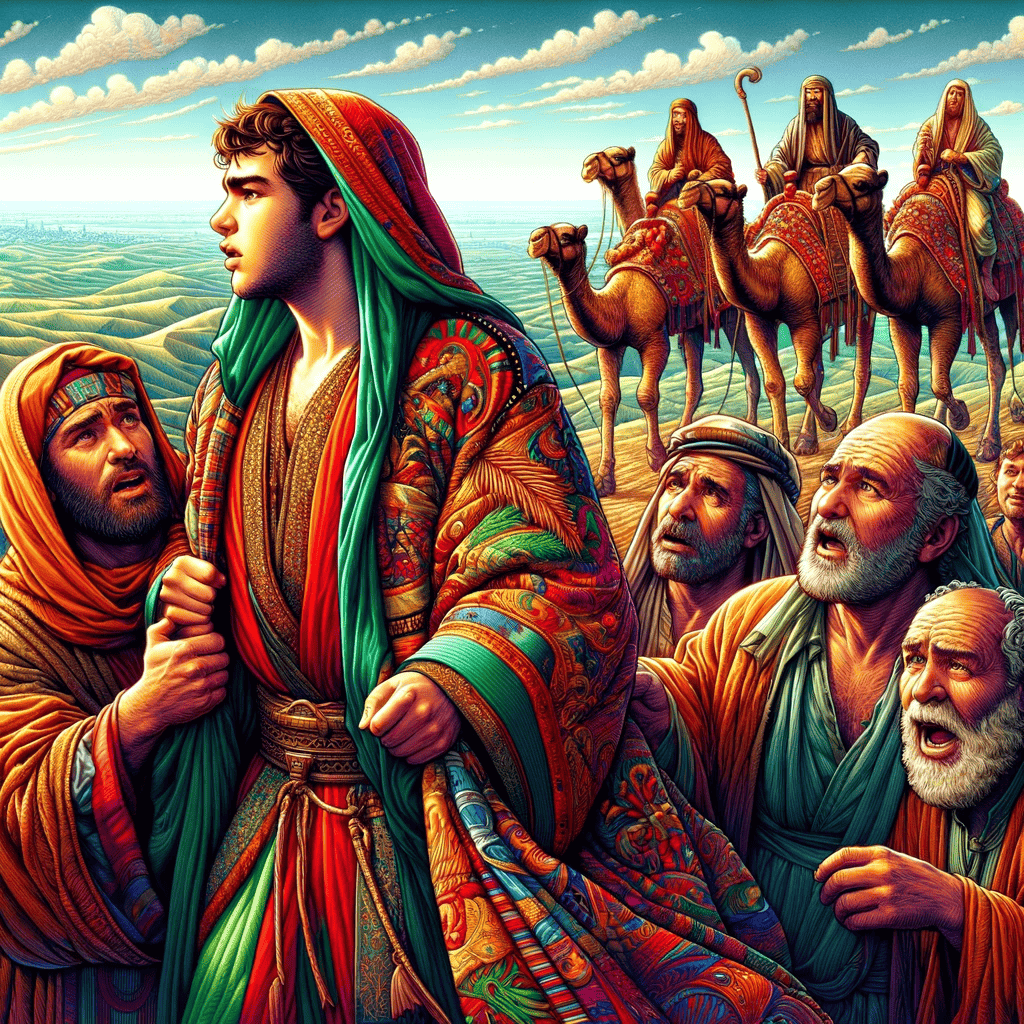
The story of Joseph and his brothers, spanning from Genesis 37 to Genesis 50, is one of the most compelling narratives in the Bible, filled with themes of jealousy, betrayal, redemption, and forgiveness.
Joseph, the eleventh son of Jacob and the firstborn of Rachel, was his father’s favorite. Jacob made no secret of his preference, even gifting Joseph a richly ornamented coat, which sparked envy and hatred among his brothers. This favoritism, combined with Joseph’s dreams that foretold his ascendancy over his family, fueled his brothers’ resentment.
One day, when Joseph was sent by Jacob to check on his brothers tending the flock, their jealousy reached its peak. They plotted to kill him but ultimately decided to sell him into slavery to a caravan of Ishmaelites heading to Egypt. To cover up their deed, they dipped Joseph’s coat in goat’s blood and presented it to their father, leading Jacob to believe his beloved son was dead, consumed by a wild animal.
In Egypt, Joseph was sold to Potiphar, the captain of Pharaoh’s guard. Blessed with God’s favor, Joseph excelled in Potiphar’s house, earning his trust and managing his household. However, after rejecting advances from Potiphar’s wife and being falsely accused of attempted rape, Joseph was imprisoned. In prison, he again found favor, both with the warden and God, and became known for his ability to interpret dreams.
Pharaoh, troubled by his own dreams, learned of Joseph’s gift and summoned him. Joseph interpreted Pharaoh’s dreams as seven years of abundance followed by seven years of famine and advised Pharaoh to store grain during the plentiful years. Impressed, Pharaoh appointed Joseph as the vizier of Egypt, second in command only to Pharaoh himself.
During the famine, Joseph’s brothers came to Egypt seeking grain, not recognizing him. Joseph, recognizing them, tested their characters through a series of trials. Finally revealing his identity, Joseph forgave his brothers, attributing their actions to God’s plan to save lives. He invited his family to live in Egypt, providing them with land and sustenance.
Joseph’s journey from favored son to slave, then prisoner, and finally to ruler of Egypt, serves as a profound narrative on the themes of providence, resilience, and reconciliation. His ability to forgive his brothers, despite their betrayal, and his insight to see God’s hand in his life’s trajectory, offer timeless lessons.
After revealing his identity to his brothers, Joseph’s reunion with his family is deeply moving. He weeps openly upon seeing Benjamin, his only full brother, and extends forgiveness and support to the very brothers who had wronged him. This act of forgiveness is not a mere emotional response; it’s a deliberate choice to transcend bitterness and recognize a higher purpose in the sufferings he endured.
Joseph’s wisdom and foresight during the years of abundance and famine are notable. He implements an efficient strategy to store and manage Egypt’s resources, saving not just Egypt but also the surrounding nations from starvation. This pragmatic approach to crisis management showcases Joseph’s growth from a dreamy youth to a wise and effective leader.
The narrative also highlights Joseph’s deep faith in God’s sovereignty. He interprets his life’s events, including his brothers’ betrayal and his rise to power, as part of God’s greater plan for good. Joseph tells his brothers, “You intended to harm me, but God intended it for good to accomplish what is now being done, the saving of many lives” (Genesis 50:20). This perspective underscores a central theme of the Bible: God’s ability to work through human actions, even evil ones, to achieve His purposes.
Joseph’s request for his bones to be carried out of Egypt reflects his belief in God’s promise to Abraham, Isaac, and Jacob about the land of Canaan. It foreshadows the Israelites’ exodus from Egypt and their journey to the Promised Land. This act of faith signifies Joseph’s lasting legacy and his deep connection to God’s covenant with his ancestors.
In conclusion, the story of Joseph and his brothers encompasses a wide range of human experiences and emotions — from jealousy and despair to triumph and forgiveness. It illustrates the complexities of family dynamics, the consequences of our actions, and the importance of faith in navigating life’s challenges. Joseph’s life teaches us about the power of forgiveness, the importance of faith in God’s plan, and the possibility of redemption and reconciliation, no matter the past grievances. Through this narrative, the Bible conveys enduring truths about human nature, divine providence, and the transformative power of grace and forgiveness.